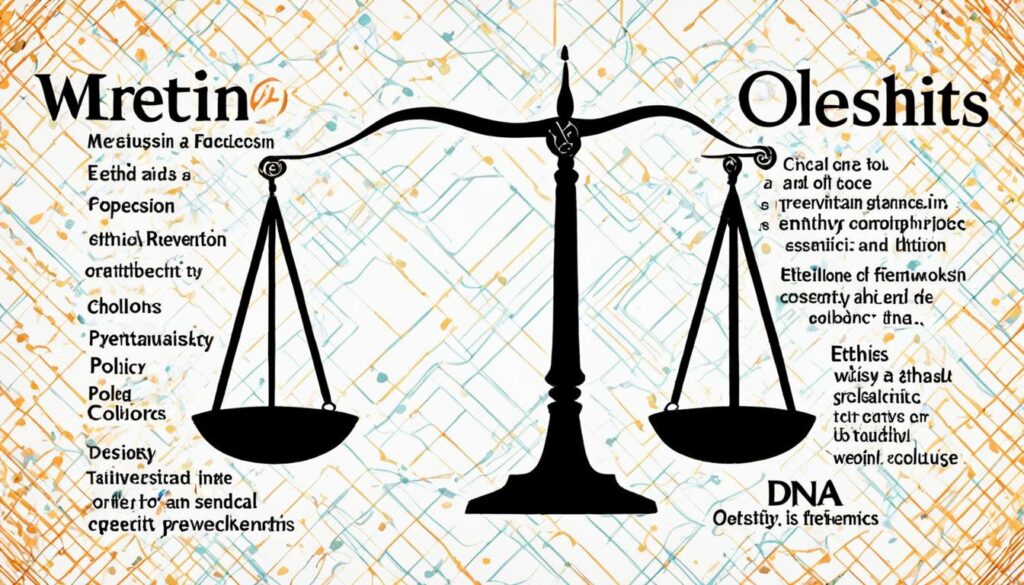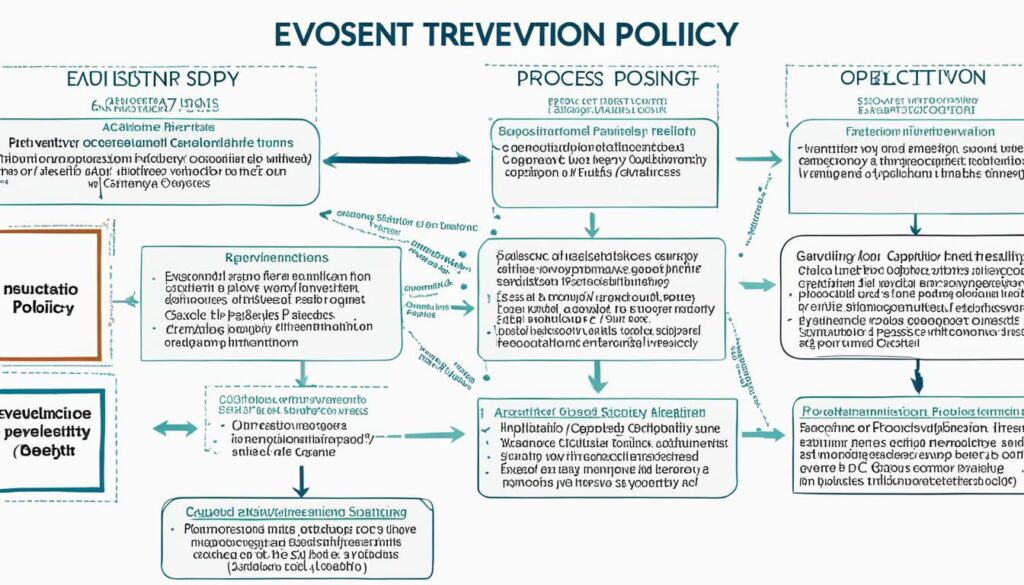Welcome to this informative article on the framework for obesity prevention policy interventions. As a professional in the field of public health, I understand the importance of implementing effective policies to combat the growing challenge of obesity. In this article, we will explore various aspects of obesity prevention, policy interventions, and the framework that can assist decision-makers in making informed choices to address this critical issue.
Obesity has become a significant public health concern, with its prevalence rising at an alarming rate. It is crucial for policymakers at national, regional, and local levels to develop comprehensive strategies that focus on preventing obesity and improving population health. However, it is equally important to evaluate the evidence base for these policies and ensure they are ethically sound.
Key Takeaways:
- An effective framework for obesity prevention policy interventions is essential in addressing the complex issue of obesity.
- Policymakers should consider the evidence base, ethical dimensions, liberty, and equity when formulating obesity prevention policies.
- Incorporating evidence-based best practices and considering various dimensions such as feasibility and potential side effects can lead to more effective policy decisions.
- Using a libertarian-paternalist approach can help shape healthy default choices while preserving individual freedom.
- Evaluating the impact of policies on health equity and addressing potential disparities is crucial in obesity prevention.
The Growing Challenge of Obesity
Obesity has become a rapidly rising global health challenge, requiring urgent policy responses at national, regional, and local levels. The prevalence of obesity has reached alarming levels, with significant implications for individuals' health and well-being, as well as public health systems.
Preventing obesity is crucial to address this growing health crisis. A comprehensive approach that combines preventive strategies and policy interventions is necessary to effectively tackle this complex issue. By implementing evidence-based obesity prevention policies, we can work towards reducing the prevalence of obesity and improving the overall health of communities.
However, there are concerns surrounding the limited evidence base for policy interventions and the potential disparities associated with current obesity policies. It is important to evaluate the effectiveness of different obesity prevention strategies and consider how they may impact liberty and equity (see my post here). By doing so, we can ensure that policies not only effectively prevent obesity but also promote fairness and social justice.
“Preventing obesity requires a multi-dimensional approach that considers both individual behaviors and the broader social and environmental factors that contribute to obesity.”
The Need for Evidence-Based Policy Interventions
While there is a growing recognition of the importance of obesity prevention policies, it is crucial to base these policies on sound evidence. This includes evaluating the effectiveness of various strategies, such as promoting healthy eating, increasing physical activity, and creating an environment conducive to healthy choices.
Evaluating the evidence base for policy interventions allows us to identify what works and what doesn't when it comes to preventing obesity. This information can inform the development and implementation of effective obesity prevention policies that have a meaningful impact on reducing obesity rates.
Addressing Concerns About Paternalism and Disparities
Obesity prevention policies often face criticisms related to their paternalistic nature and potential disparities. Critics argue that policies that restrict individual choices may infringe upon personal liberty. Furthermore, there is a concern that certain populations, particularly those already facing social disadvantages, may be disproportionately affected by these policies.
It is essential to carefully consider these concerns when designing and implementing obesity prevention policies. Policies should strike a balance between promoting healthier behaviors and respecting individual autonomy. They should also address potential disparities by ensuring that all populations have equal access to resources and opportunities for healthy living.
Policy Interventions for a Healthier Future
To effectively address the challenge of obesity, we must implement evidence-based obesity prevention policies that prioritize individual and community health. By employing a comprehensive approach that considers various strategies and interventions, we can create an environment that supports healthy choices and prevents obesity.
Obesity prevention policies should focus on education and awareness, promoting healthy eating habits, increasing physical activity opportunities, and creating supportive environments (see my post here). Such policies can empower individuals to make informed choices and lead healthier lifestyles.
By adopting a proactive approach to obesity prevention, we can work towards creating a healthier future for all individuals and communities. Through evidence-based policy interventions, we can promote positive change and prevent the further escalation of obesity rates.
Evaluating the Evidence Base for Obesity Policies
In order to develop effective obesity prevention policies, it is crucial to evaluate the evidence base for different interventions. This evaluation process involves conducting comprehensive reviews of the available evidence to assess the effectiveness, safety, and feasibility of policy approaches. By critically analyzing the existing research, policymakers can make informed decisions that are grounded in the best available evidence.
One approach to evaluating obesity policies is through systematic reviews, which involve systematically searching, appraising, and synthesizing the published literature on a specific topic. These reviews provide a rigorous and objective assessment of the evidence, allowing policymakers to identify best practices and evidence-based interventions.
Additionally, it is important to consider the ethical implications of obesity policies. A libertarian-paternalist framework can be a valuable tool in this evaluation process. This framework explores the balance between liberty and paternalism, acknowledging the need to respect individual autonomy while also recognizing the potential benefits of guiding individuals towards healthier choices.
Furthermore, the inverse-equity theory highlights the importance of assessing the impact of policies on health disparities. By evaluating the potential consequences of obesity policies on different population groups, policymakers can ensure that their interventions do not inadvertently exacerbate existing health inequities.
“Evaluating the evidence base for obesity policies is essential for identifying the most effective interventions and minimizing unintended consequences. By combining rigorous evidence reviews with ethical considerations, policymakers can develop obesity prevention strategies that promote both individual health and societal well-being.”
By evaluating the evidence base and incorporating ethical considerations, policymakers can develop obesity prevention policies that are evidence-based, ethically sound, and effective in addressing the complex issue of obesity.
Challenges in Incorporating Evidence into Policy Making

When it comes to policy-making, incorporating evidence can be a complex and challenging task. Decision-makers face several obstacles in integrating research findings into the political process in order to make informed policy decisions. One of the primary challenges is the limitations of the rational analytic model traditionally used in policy-making.
The rational model assumes that decision-makers are rational and objective, basing their decisions on a careful analysis of available evidence. However, in reality, policy decisions are influenced by various factors such as political considerations, stakeholder interests, and public opinion, which may not always align with the empirical evidence.
Another challenge is the difficulty in identifying and accessing the best practices in a given policy area. Evidence from research studies, evaluations, and systematic reviews is scattered across different sources and may not be easily accessible or well-known to decision-makers. This makes it challenging to incorporate the most up-to-date and relevant evidence into policy-making processes.
Importance of Best Practices
Incorporating evidence-based best practices is crucial for effective policy-making. By relying on scientifically sound research findings, decision-makers can ensure that their policies are grounded in the latest evidence and have a higher likelihood of achieving the desired outcomes. Best practices provide a blueprint for success and can guide policy interventions towards effective and efficient solutions.
Quote: “Policy-making should be evidence-informed rather than evidence-led.” – Dr. Sara E. Gorman
However, the challenge lies in identifying and synthesizing the vast amount of evidence available in a way that is meaningful and practical for policy-makers. To address this challenge, there is a need for robust knowledge translation mechanisms that facilitate the translation of research findings into policy-relevant formats, such as policy briefs or practice guidelines.
Integrating Evidence and Decision-Making
Integrating evidence effectively into policy-making requires a collaborative approach that involves researchers, policymakers, and other stakeholders. Decision-makers need to actively engage with researchers to understand the nuances of the evidence, its applicability to the local context, and its potential implications for policy decisions.
Moreover, decision-making processes should consider a combination of evidence, values, and ethics to ensure that policies are not only evidence-based but also ethically sound. This involves understanding the potential trade-offs and unintended consequences of different policy options and making decisions that optimize both evidence and ethical considerations.
Overcoming Challenges
To overcome the challenges in incorporating evidence into policy-making, several strategies can be employed:
- Improving accessibility and availability of evidence through centralized repositories or knowledge management systems.
- Investing in capacity-building initiatives to enhance policymakers' understanding and use of evidence.
- Promoting a culture of evidence-informed decision-making within policy-making institutions.
- Encouraging collaboration and knowledge exchange between researchers, policymakers, and practitioners through platforms such as policy dialogues or communities of practice.
| Challenges | Strategies |
|---|---|
| Limited adoption of evidence-based approaches | 1. Enhance education and training on evidence-based policy-making 2. Provide incentives and recognition for evidence-informed policy decisions |
| Complexity of research findings | 1. Develop clear and concise summaries of research evidence 2. Collaborate with researchers to co-produce policy-relevant evidence |
| Political and stakeholder pressures | 1. Foster transparency and accountability in policy-making processes 2. Engage stakeholders early in the policy development process |
By addressing these challenges and implementing the suggested strategies, decision-makers can enhance the rationality and effectiveness of policy decisions, ensuring that evidence plays a crucial role in shaping policies that have a positive impact on society.
Bridging the Evidence Gap in Obesity Prevention
In order to effectively address the issue of obesity, it is crucial to bridge the evidence gap and ensure that policy interventions are based on sound evidence. The concept of practice-based evidence plays a significant role in filling this gap and informing obesity prevention strategies.
Evidence gap refers to the lack of sufficient research or evidence in a particular area. When it comes to obesity prevention, there is a need for more practice-based evidence, which involves gathering data and insights from real-world settings and applying them to policy decisions.
Policy interventions should be guided by reliable evidence to ensure their effectiveness in combating obesity. This requires a comprehensive approach that takes into account various dimensions of policy decision-making.
The Institute of Medicine's framework provides a valuable resource for locating, evaluating, and assembling evidence in obesity prevention policy development. This framework helps decision-makers consider key factors like feasibility, sustainability, effects on equity, potential side effects, and acceptability to stakeholders.
By considering these dimensions, policymakers can make more informed decisions and develop obesity prevention strategies that are evidence-based, practical, and inclusive.
| Key Dimensions in Obesity Prevention Policy Decisions | Description |
|---|---|
| Feasibility | Assessing the practicality and effectiveness of proposed interventions. |
| Sustainability | Evaluating the long-term viability and impact of policy measures. |
| Effects on Equity | Considering the potential impact of policies on health disparities and social equity. |
| Potential Side Effects | Anticipating any unintended consequences or negative outcomes of interventions. |
| Acceptability to Stakeholders | Ensuring that the proposed policies are acceptable and supported by relevant stakeholders. |
By integrating practice-based evidence and considering these dimensions, policymakers can bridge the evidence gap and develop comprehensive obesity prevention policies. This approach enables a more holistic understanding of the issue and promotes the adoption of effective strategies that address the complex nature of obesity.
The Role of Libertarian-Paternalism in Obesity Policies

In the realm of obesity policies, an innovative approach known as libertarian-paternalism has emerged. This approach focuses on preserving individual liberty while guiding individuals towards healthier choices. The concept of libertarian-paternalism recognizes that people's decisions are shaped by external influences, such as the environment and social norms.
Libertarian-paternalism aims to make the default choices healthier, thus influencing behavior change without restricting freedom of choice. By providing nudges and gentle guidance, policymakers can steer individuals towards better decisions without imposing strict regulations or mandates.
Behavioral economics plays a crucial role in informing the principles of libertarian-paternalism. It delves into the psychological factors that impact decision-making and explores techniques to promote positive behavior change.
Furthermore, neoinstitutionalism contributes to understanding how external factors, such as social norms and cultural values, affect individuals' choices. This knowledge helps shape effective policies that align with societal preferences and values.
The integration of libertarian-paternalism, behavioral economics, and neoinstitutionalism offers a nuanced approach to obesity policies. By understanding the underlying influences on individuals' choices, policymakers can design interventions that foster healthier behaviors while respecting personal freedom.
“Libertarian-paternalism aims to strike a delicate balance between promoting health and respecting individual autonomy, ultimately guiding individuals towards healthier choices.”
The Application of Libertarian-Paternalism in Obesity Policies
Researchers and policymakers have explored various policy interventions grounded in libertarian-paternalism principles. These interventions often focus on improving the default options available to individuals.
Example:
A popular application of libertarian-paternalism is seen in school lunch programs. By making nutritious meals the default option and ensuring their availability, schools enable students to make healthier choices effortlessly. This approach encourages positive behavior change and contributes to obesity prevention efforts.
Policy interventions inspired by libertarian-paternalism can also be observed in other domains, such as food labeling and portion size regulations. These initiatives nudge individuals towards healthier choices without infringing upon their freedom of choice.
The Benefits of Libertarian-Paternalism
Libertarian-paternalism offers several advantages when applied to obesity policies. By leveraging behavioral insights and considering societal norms, policymakers can:
- Encourage healthier default choices
- Empower individuals to make informed decisions
- Facilitate behavior change without heavy-handed regulations
- Respect individual autonomy and personal freedom
The Limitations and Ethical Considerations
While libertarian-paternalism presents a promising approach, it is not without limitations and ethical implications. Critics argue that it may manipulate individuals' choices and exert undue influence over their decision-making processes. Striking a balance between promoting health and safeguarding individual liberty is crucial to address these concerns effectively.
It is important for policymakers to carefully consider the potential unintended consequences and ensure transparency in the implementation of libertarian-paternalism measures. Maintaining ethical standards and securing public trust are paramount in the pursuit of effective obesity policies.
| Advantages of Libertarian-Paternalism in Obesity Policies | Ethical Considerations |
|---|---|
| Encourages healthier default choices | Potential manipulation of choices |
| Empowers individuals to make informed decisions | Exerting undue influence on decision-making |
| Facilitates behavior change without restrictive regulations | Ensuring transparency in implementation |
| Respects individual autonomy and freedom | Maintaining ethical standards |
Evaluating the Impact of Policies on Health Equity

When it comes to obesity prevention, it is crucial to evaluate the impact of policies on health equity. The goal is to ensure that policies designed to address obesity do not inadvertently contribute to the disparities in health outcomes among different sub-groups of the population. By evaluating the distribution of health outcomes across various demographics, we can assess the effectiveness and potential disparities associated with obesity prevention policies.
“Health equity is a fundamental principle in public health. It means that everyone has a fair and just opportunity to be as healthy as possible. When it comes to obesity prevention, we must consider whether our policies are promoting health equity or inadvertently exacerbating health disparities,” explains Dr. Sarah Johnson, a renowned expert in public health and health equity.
Evaluating the impact of policies on health equity involves examining the accessibility and affordability of obesity prevention interventions, identifying any potential barriers that certain sub-groups may face, and determining whether interventions are reaching those most in need. It also involves analyzing the distribution of resources and opportunities for healthy living across different communities.
By conducting a comprehensive evaluation, policymakers can gain valuable insights into the effectiveness and potential disparities associated with obesity prevention policies. This enables them to make informed decisions and implement targeted interventions that not only address obesity but also promote health equity.
The Role of Data in Evaluating Health Equity
Accurate and reliable data play a crucial role in evaluating the impact of policies on health equity. Data can provide insights into the prevalence of obesity, the distribution of health outcomes, and the effectiveness of interventions across different population groups.
Through the collection and analysis of data, policymakers can identify disparities in obesity rates, access to healthy food options, opportunities for physical activity, and healthcare services. This information allows for targeted interventions to be developed and implemented to address the specific needs of different sub-groups.
Dr. Johnson emphasizes the importance of data-driven decision-making, stating, “Data is the backbone of evidence-based policymaking. By analyzing comprehensive data sets, we can identify areas of improvement, measure progress, and ensure that our policies are not inadvertently perpetuating health inequalities.”
Evaluating Policy Impact through a Health Equity Lens
When evaluating the impact of policies on health equity, it is essential to consider multiple dimensions. These dimensions include not only physical health but also social, economic, and environmental factors that contribute to disparities in health outcomes.
By adopting a health equity lens, policymakers can assess the potential unintended consequences of policies and interventions. This involves analyzing the influence of policies on social determinants of health, such as income, education, employment, and housing. It also requires considering the unique challenges faced by marginalized communities and developing strategies to mitigate disparities.
Evaluating policy impact through a health equity lens allows for a more comprehensive understanding of the effectiveness and potential disparities associated with obesity prevention efforts. By identifying and addressing these disparities, policymakers can work towards achieving equitable health outcomes for all.
Integrating Evidence and Ethical Principles in Decision Making

In the realm of obesity prevention policies, the integration of evidence, theory, and ethical principles is crucial in making informed and effective decisions. By combining these elements, policymakers are better equipped to address the complex challenges associated with obesity and develop policies that promote positive health outcomes.
When faced with incomplete evidence, decision-makers can utilize the precautionary principle to guide their actions. This principle emphasizes taking preventive measures even in the absence of definitive evidence, considering the potential risks and benefits. It encourages a proactive approach to policy-making, prioritizing public health and well-being.
However, ethical considerations should also play a significant role in decision-making processes. Paternalism, for example, raises concerns about the violation of individuals' autonomy and freedom of choice. Policymakers must strike a balance between implementing interventions that promote healthy behaviors while respecting personal liberties.
Equity is another vital ethical principle to consider. Obesity affects diverse populations differently, and policies should prioritize reducing disparities and ensuring equitable access to resources and opportunities for improved health outcomes.
Integrating evidence, theory, and ethical principles is essential in guiding the development of effective obesity prevention policies. By carefully considering the precautionary principle and addressing ethical concerns such as paternalism and equity, policymakers can make decisions that promote positive health behaviors and outcomes for all.
Evidence-informed Decision Making
Effective decision-making relies on a robust evidence base, combining scientific research, expert opinions, and real-world data. By incorporating evidence into the policy-making process, policymakers can identify strategies and interventions that have proven to be effective in reducing obesity rates.
This evidence can come from various sources, including systematic reviews, randomized controlled trials, and practice-based evidence. Systematic reviews synthesize existing research to provide a comprehensive understanding of the effectiveness of different approaches. Randomized controlled trials, considered the gold standard in research, can provide valuable insights into the impact of specific interventions.
Practice-based evidence, on the other hand, draws from real-world experiences and case studies, showcasing the effectiveness of interventions in different contexts. This type of evidence can help bridge the gap between research and policy implementation, providing practical insights for decision-makers.
Summary of Evidence and Ethical Principles in Decision Making
| Evidence | Theory | Ethical Principles |
|---|---|---|
| Research studies, systematic reviews, randomized controlled trials, practice-based evidence | Precautionary principle, behavioral economics, neoinstitutionalism | Autonomy, paternalism, equity |
By integrating evidence, theory, and ethical principles, decision-makers can develop well-informed policies that address the complex challenges of obesity prevention. This holistic approach ensures that interventions are based on the best available evidence, guided by ethical considerations, and designed to promote equitable health outcomes.
Applying the Evaluation Framework to Obesity Prevention Policy Interventions

As we strive to combat the growing challenge of obesity, it is crucial to evaluate the effectiveness of policy interventions. In this section, I will introduce the evaluation framework developed by the Center for Translational Research in Translation (Center TRT) and explore how it can be applied to obesity prevention efforts.
The Center TRT's evaluation framework provides a comprehensive approach to assess policy interventions, monitor their progress, and assess their outcomes. By utilizing this framework, policymakers and public health practitioners can gain valuable insights into the effectiveness of their initiatives and make informed decisions for future interventions.
When applying the evaluation framework, it is important to engage stakeholders throughout the process. By involving stakeholders such as community members, healthcare professionals, and policymakers, we can ensure that the evaluation captures diverse perspectives and experiences.
Describing the program is another vital step in the evaluation process. By documenting the details of the obesity prevention policy intervention, we can better understand its objectives, target population, and implementation strategies.
The evaluation design should be carefully developed to address key research questions and collect relevant data. This may involve utilizing different evaluation methods such as quantitative surveys, qualitative interviews, or systematic reviews to gather credible evidence on the impact of the policy interventions.
Justifying conclusions based on the evidence collected is crucial in the evaluation process. By carefully analyzing the data and drawing evidence-based conclusions, we can provide valuable insights into the effectiveness of the obesity prevention policy interventions.
Finally, disseminating and using the findings of the evaluation is essential for driving evidence-based practice. By sharing the results with key stakeholders, policymakers, and the wider public health community, we can contribute to the collective knowledge base and guide future policy decisions.
| Evaluation Framework Steps | Description |
|---|---|
| 1. Engage stakeholders | Involve relevant individuals and organizations to gather diverse perspectives. |
| 2. Describe the program | Document the details of the obesity prevention policy intervention. |
| 3. Focus the evaluation design | Develop a clear research plan to address evaluation objectives. |
| 4. Gather credible evidence | Utilize appropriate evaluation methods to collect data. |
| 5. Justify conclusions | Analyze the data collected and draw evidence-based conclusions. |
| 6. Disseminate and use findings | Share the results with stakeholders and contribute to evidence-based practices. |
By following the Center TRT's evaluation framework, we can strengthen the evidence base for obesity prevention policy interventions and ensure that our efforts are guided by practice-based evidence. This comprehensive approach helps us understand the impact of policy interventions and make informed decisions to combat obesity effectively.
Conclusion
In conclusion, it is evident that the implementation of a comprehensive evaluation framework is crucial for effective obesity prevention policy interventions. This framework allows policymakers and public health practitioners to assess the impact of their initiatives and make evidence-based decisions.
The evaluation framework for obesity prevention policy interventions includes key elements such as practice-based evidence, which plays a vital role in addressing the gaps in current policy approaches. By utilizing practice-based evidence, policymakers can enhance the effectiveness of policy interventions and ensure that they are tailored to the specific needs of the target population.
It is imperative for public health practitioners to adopt the evaluation framework and incorporate it into their policy-making processes. By doing so, they can contribute to the body of evidence-based practices and make positive strides in the fight against obesity. Through ongoing evaluation, monitoring, and assessment of outcomes, we can continuously refine and improve obesity prevention policies to achieve better health outcomes for all.




